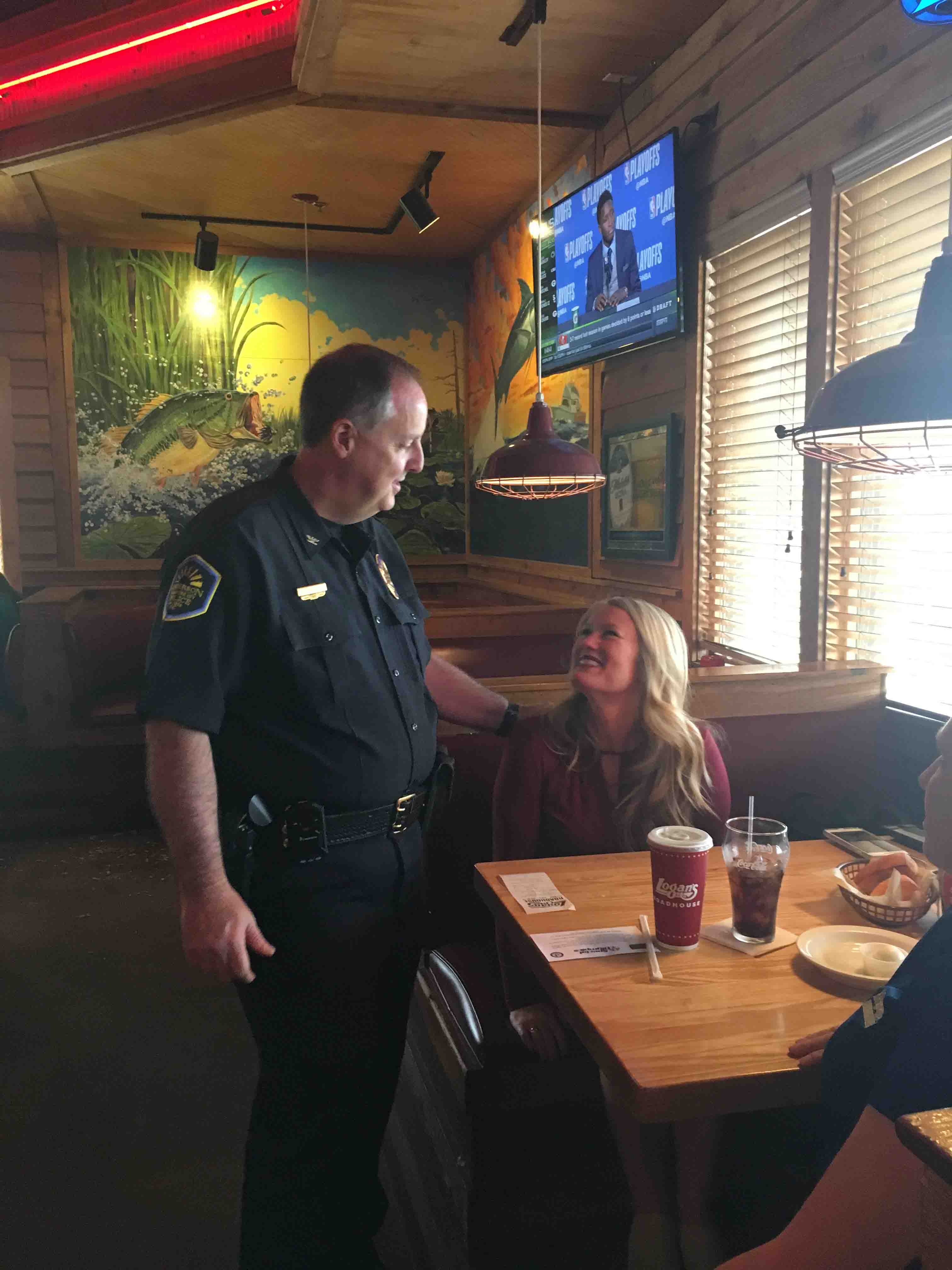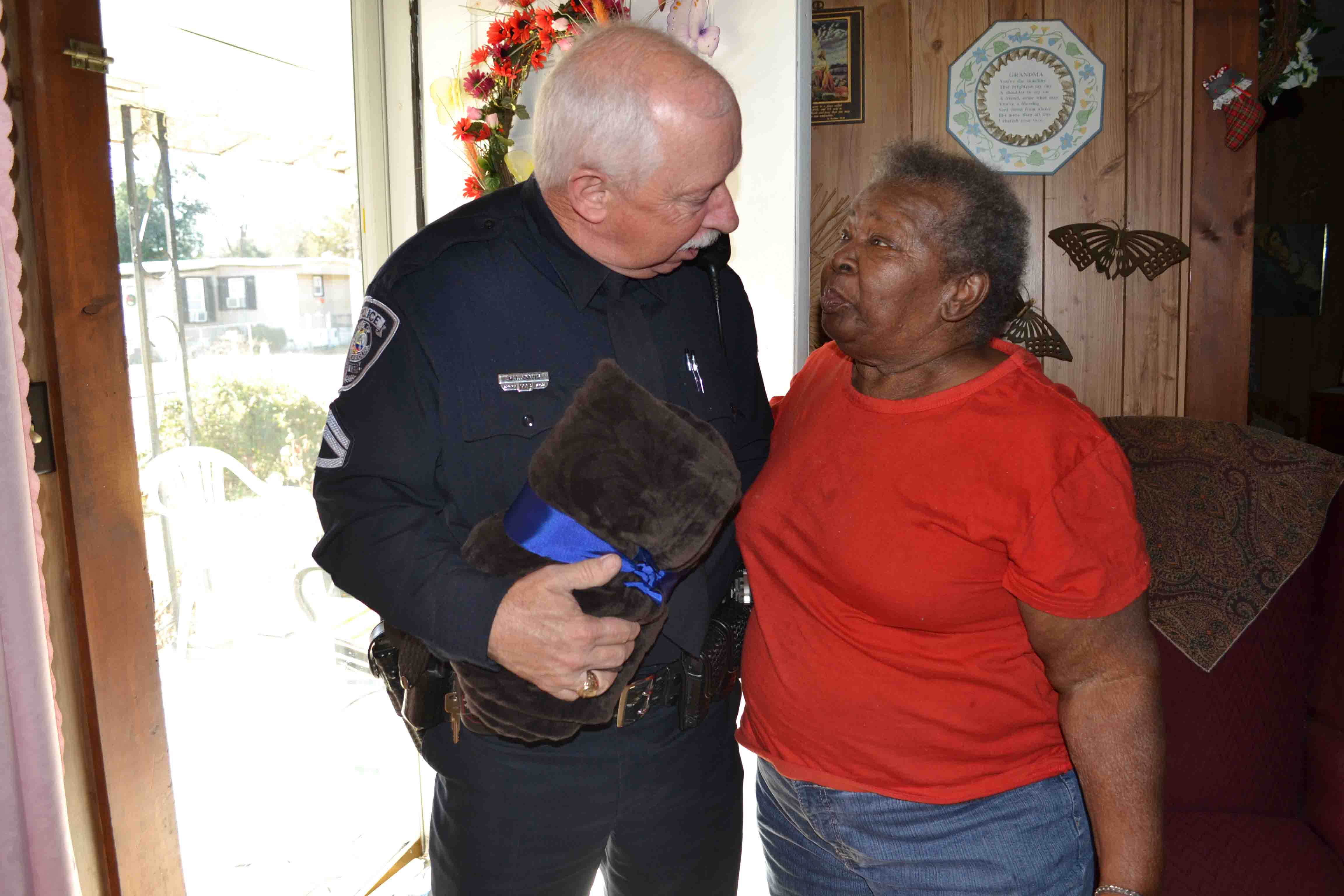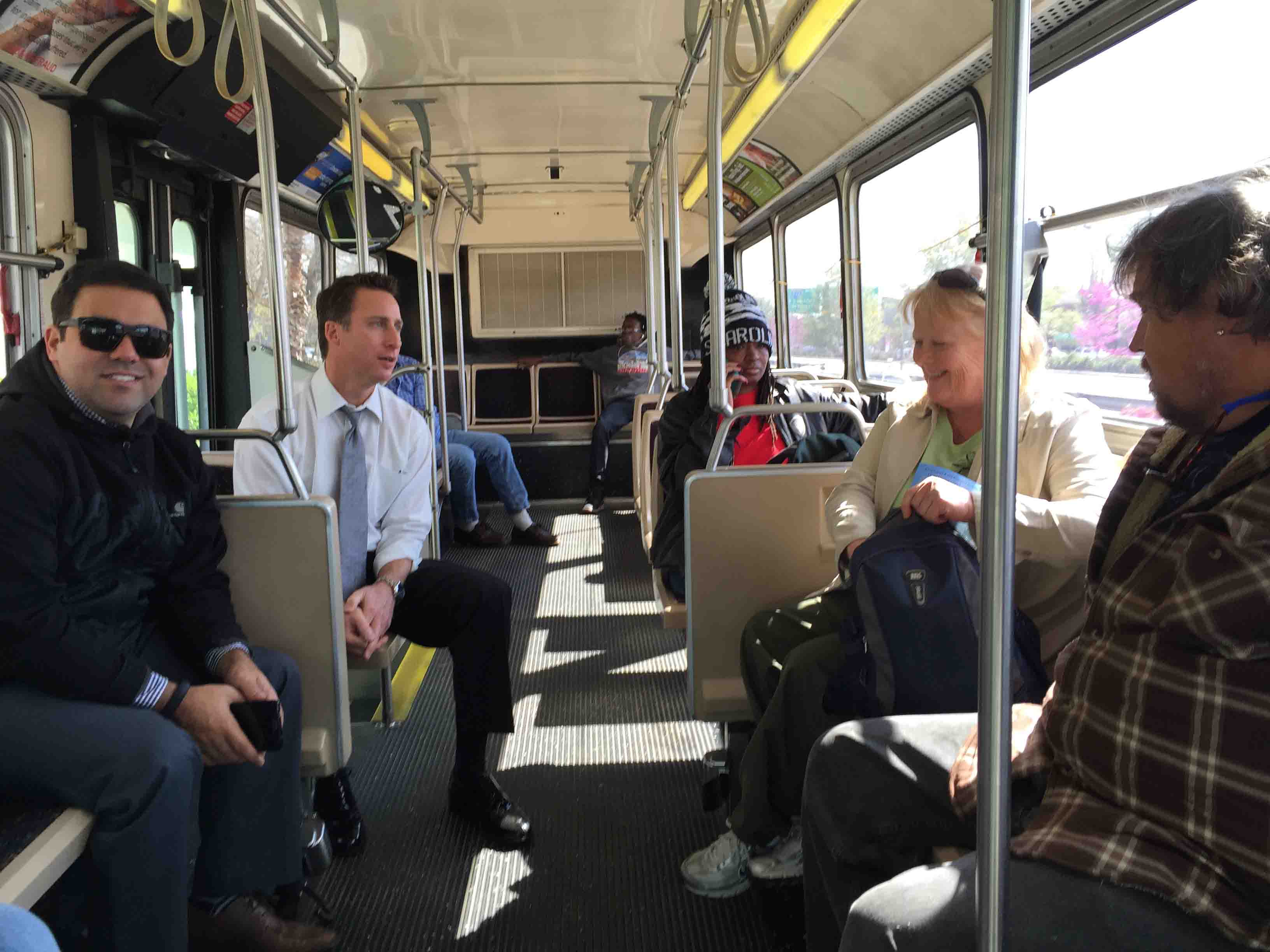The "Day in the Life" series gives an insider's look at the professions that make South Carolina cities and towns great places to live, work and play. Municipal employees from around the state explain their role, discuss challenges they face and share stories from the unique world of municipal government service.
Hands On, Hearts On
As Anderson Police Chief Jim Stewart scribbled notes, an eighth-grade girl stared back at him skeptically.

Anderson Police Chief Jim Stewart waits tables at a local restaurant as part of
his resident engagement campaign. Photo: Anderson Police Department.
"I don't know why you're writing all this down," she told the chief, who was surrounded by alternative school students during a law enforcement listening session with local youth. "If you're not going to take us seriously, you're wasting your time," the girl continued.
But Stewart was paying close attention. He wanted to know what the young people thought of their local police department.
"If I'm writing this down, we're going follow up on it," he replied. "I'm not writing this down to stay busy in a meeting. We will act on what you are telling us."
By the end of the meeting, "She was my buddy," Stewart recalled.
It was just one community meeting Stewart had attended as part of the Law Enforcement and Community Relations Task Force, a push to improve interactions between police and residents, especially in minority neighborhoods. The initiative, which unfolded in 2015, spans 4,000 residents and 63 events, from Bible schools to neighborhood committees to nonprofits, civic clubs and projects for the needy.
The police department worked closely with city administration and the African American Ministerial Council at first and then spread to the school district, SC Department of Juvenile Justice, solicitor's office and other partners. The city's police officers addressed specific community questions, such as "Why do two officers show up to a call?" (Answer: It's a policy for officer safety.)
For Stewart, there was a common thread: He kept putting himself in unusual positions, appearing places where a police chief was unexpected. One day he was serving food and refilling iced tea glasses at a restaurant. Another day he was teaching Sunday school at a church that wasn't his own.
"You make deposits," said Stewart. "One day, you'll have to make that withdrawal."
The lesson? Anyone on a city's staff can be a "resident engagement" leader, even — and in some cases, especially — the police chief.
Like Stewart, Lauren Sims, the Town of Mount Pleasant's community and government affairs chief, is on a daily mission to connect residents to local government and to one another. And like Stewart, Sims has learned to be versatile.
"This isn't so much of a job — yes, it's exhausting, and the hours can be long — but to me, it's a purpose," Sims said. "When I think about what I'm doing in the community, and I think about whether it's something simple like providing information or connecting people to resources, I'm also thinking about the people themselves."
Like Sims, Warren Davis also doesn't see his role as a job.
"It's more of a ministry," he said of his Sumter Police Department program, CheckMate, which keeps a watchful eye on vulnerable seniors and residents with disabilities who have no one local to turn to.
"It's a calling the chief put me into four years ago."

Papa G, who leads the Sumter Police Department's CheckMate program, visits residents throughout the week to assist them with basic household repairs and promotes safety and wellbeing.
Photo: Sumter Police Department.
Through CheckMate, he updates residents' emergency contact information, suggests ways for them to improve safety and deter crime and makes referrals to other agencies if necessary.
Davis, a senior corporal and former patrol division officer, does the same training as any other police officer. Of his special role with CheckMate: "I don't think there's anything hard about it. I am a certified officer. A lot of times that makes people feel at ease."
The tools of engagement
What does it take to champion a town's shared community identity?
"It's a desire to help people and see people for what they are, and that's a fellow human being," said Sims. "A lot of times with technology, which can be a great and helpful tool, sometimes it can remove the human element. You're dealing with a username."
Sims, who grew up in Mount Pleasant, is right at home when she heads into the field with her laptop, water bottle and signup sheets to subscribe residents to newsletters. The water bottle is key for Sims, who does a lot of talking for her job.
As for Stewart, his best tool fits in his pocket.
"I carry a stack of cards, so before we leave a meeting, I give all students my contact information," said Stewart. "That's my number one tool." Depending on the age of his audience, he wields ice cream cones. Squad cars for students to climb into also work well.
For Davis of Sumter, his on-the-job tools include "compassion" and "a little step stool."
"What happens when your 82-year-old mother has a light go out? Does she get on a ladder and change it?" he said. "I certainly hope not."
Expect anything — And learn to adapt
There's no typical day.
Sims might speak with members of a neighborhood about their speeding concerns, attend roundtable meetings with a homeowner association board or assist the mayor at an outreach event. When she's in the office, she is researching the impacts of existing programs and evaluating their effectiveness.
Sims has learned to be flexible and adjust her methods according to experiences. For instance, she knows now that meetings that involve more than 20 residents have a tendency to break off into pockets of residents. She also learned that the old advice to "go where the people are" isn't a sure thing.

Eric DeMoura, town administrator for the Town of Mount Pleasant, rides the bus with residents to learn about their experiences in the town. Photo: Town of Mount Pleasant.
On one occasion, town officials set up a booth at a clean water/safe fishing event, but residents walked right by without stopping.
"Even when you sat there and say, 'can we talk? Where do you live?' people were laser focused on the event and weren't interested in anything else," said Sims.
In the City of Sumter, Davis, who goes by "Papa G" — It started out as Warren G but became "papa" after his hair started to turn gray — takes a different approach to resident engagement.
"I've had a person call and say, 'I've got some guy replacing the water meter at my house, and I'm a little unsteady about this person,'" said Davis. "I just went and talked to her when they were changing out the water meter. Sometimes it just takes a police presence. I wear my uniform and drive a marked car."
For all three, engaging residents for a living is exactly what they want to do.
It makes sense for Sims: "These are the people I care most about in the world."
